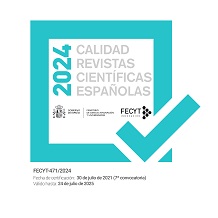The pre-school feeding, health education from 2 to 6 years
Abstract
The infant feeding and nutrition is one of the most important areas regarding the Health Education (HE). This health-promoting action must start at the early stage of the development and learning, such as the pre-school period. A valuable tool to initiate successfully the HE could be infant nutrition, which can and must be also approached in the educational area.Our objective of the investigation was to gather, from the main Spanish manuals of nutrition, the basic and nutritional characteristics of the stage from 2 to 6 years, in order to be used by educational personnel instead of health personnel in the school area. By the analysis of bibliographical documented review, related to the nutritional characteristics at this stage of growth.
The results indicate that the Recommendations Dietary Allowance (RDA) from 2 years are very different with regard to the breast-fed stage, the contribution moves towards the carbohydrates in 50 %, in decline of fats <30 % and proteins. In addition, the preparation and incorporation of new ingredients to the daily foods is already regular, obtaining, in this way, a balanced and healthy diet. For that, we will follow a guideline of 3 daily foods, with 2 intermediate of minor quantity, and the breakfast will have a well-deserved importance.
To conclude, we must indicate that the educator has to inculcate healthy habits of feeding in pre-school stage by means of the Health Education. The mentioned infant diet will be the base for a healthy adulthood, since during the infant stage, future pathologies may emerge such as diabetes, cancer of colon and hypertension.
Downloads
The works published in this magazine are subject to the following terms:
1. The Publications Service of the University of Murcia (the publisher) preserves the copyright of the published works, and encourages and allows the reuse of the works under the license for use stated in point 2.
© Servicio de Publicaciones, Universidad de Murcia, 2011 (© Publications Service, University of Murcia, 2011)
2. The works are published in the electronic edition of the journal under Creative Commons Reconocimiento-NoComercial-SinObraDerivada 3.0 España(texto legal) “ a Attribution-NonCommercial-NoDerivatives 3.0 Spain license (legal text)”. They can be copied, used, broadcasted, transmitted and publicly displayed, provided that: i) the authorship and original source of their publication (journal, publisher and URL) are cited; (ii) are not used for commercial purposes; iii) the existence and specifications of this license is mentioned.
3. Conditions of self-archiving. Authors are allowed and encouraged to electronically disseminate the pre-print (pre-reviewed ) and / or post-print (reviewed and accepted for publication) versions of their works prior to publication, as it ensures a wider circulation and dissemination which may lead to a possible increase in its mention and a higher scope among the academic community. RoMEO color: green.













